 MyDogBreeds
MyDogBreedsKerry Beagle is originated from Ireland but Australian Cattle Dog is originated from Australia. Kerry Beagle may grow 11 cm / 5 inches higher than Australian Cattle Dog. Kerry Beagle may weigh 11 kg / 25 pounds more than Australian Cattle Dog. Both Kerry Beagle and Australian Cattle Dog has almost same life span. Kerry Beagle may have more litter size than Australian Cattle Dog. Both Kerry Beagle and Australian Cattle Dog requires Low maintenance.
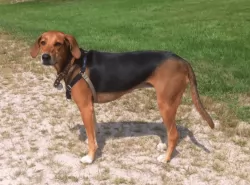 The Kerry Beagle is an ancient dog breed, thought to go back as far as the 16th century and looked upon as one of the oldest of all the Irish dog breeds. The dog was introduced to Ireland by the Celts.
The Kerry Beagle is an ancient dog breed, thought to go back as far as the 16th century and looked upon as one of the oldest of all the Irish dog breeds. The dog was introduced to Ireland by the Celts.
It is believed to have descended from the Old Southern Hound or Celtic Hounds.The Kerry Beagle was taken by Irish immigrants to America and is a foundation breed in the development of the Coonhound for hunting and scenting.
The Kerry Beagle isn't recognized by the AKC but has been recognized by the Irish Kennel Club in 1991. It is still rare outside of Ireland and it hasn't been recognized by major kennel clubs.
During the 19th century, in the New South Wales, lived a cattle farmer Thomas Hall. He wanted to have a perfect cattle dog so he mixed two breeds: dogs used by stockman with the dingo. The new breed was given an interesting name - Halls Heelers. Heelers was a part of the dog breed because this new breed of the dog inherited the nipping instinct. As time passed, one breed was developing in two breeds: the Australian Cattle Dog and the Australian Stumpy Tail Cattle Dog.
The Australian Cattle dog can be found in two available colours: red and blue. This is how they got their nicknames: Red Heeler and Blue Heeler.
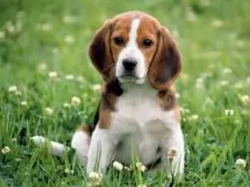 The Kerry Beagle is a medium sized dog with a solid physique. He stands at about 56 – 61cm and weighs between 22 and 27kg. He has a broad head with drop ears. His eyes are large and deep set and are a yellow to brownish color, giving the dog an intelligent expression.
The Kerry Beagle is a medium sized dog with a solid physique. He stands at about 56 – 61cm and weighs between 22 and 27kg. He has a broad head with drop ears. His eyes are large and deep set and are a yellow to brownish color, giving the dog an intelligent expression.
His coat is short and the most common color for this dog is black and tan, but you can also find tan and white or some blue mottling as well. He is a lean, muscled dog with a deep chest and legs which are slim and long, providing the dog with the ability to pick up speed on a hunt. The tail of the dog is long and slightly curved and carried level.
As a packhound this dog is a serious hunter. He may look aggressive as he goes after his prey but he is actually a calm, well-balanced, friendly dog who forms a strong, loving relationship with his human family.
He is also gentle and playful with children in the home and also gets on well with other dogs too. He is intelligent and will readily respond to training and socialization. It's a dog that just loves being outside, especially when there is something to do, such as playing ball games or going on a long walk.
He is alert and inquisitive and makes an excellent watchdog. A home with a good sized garden will be ideal for the Kerry Beagle, though it can be kept in small gardens in the city too, just so long as he is given the opportunity for daily exercise.
The Australian Cattle Dog originally mixed with Australian herding dog that was kept near the cattle to guide them. Medium-sized, with the short coat, this dog is generally easy to groom and maintain. It does require more brushing during the shedding period, but it is still not an everyday need. He is easy to train because he likes challenging games and activities which are. It gets very attached to its owner, and he is always protective of them and their possessions. The most common health problems happen with their ears and eyes, but they are usually very healthy and they have a long life – up to 15 years.
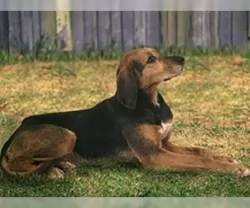 The Kerry Beagle may well be quite an aggressive dog when showing off his hunting skills, but when it comes to being around his human family, he softens up and becomes a gentle, loving friend.
The Kerry Beagle may well be quite an aggressive dog when showing off his hunting skills, but when it comes to being around his human family, he softens up and becomes a gentle, loving friend.
He is an affectionate playmate for children and also gets on well with other dogs you may have in the home.
Your Kerry Beagle is alert, intelligent and active, and when you have one of them as a 4-legged family member, you'll discover what a wonderful, devoted companion he can be.
Children and Australian Cattle Dogs can grow up together in harmony. They will have a loyal and protective companion. After you properly train your dog and teach your child how to play with the dog, you will bring the friendship on the safe side. Some of them will have the instinct to nip at heels, so you should pay attention to this while training your pet.
Special talents: cattle dog, service dog, therapy dog, police dogs, drug detection dogs.
Australian Cattle Dogs can survive cool, hot and temperate conditions. They can live in a shelter outdoors, and they do well living indoors. But, be aware – without enough physical activity, this dog will end up being frustrated and unhappy.
They will absorb every new trick so quick that you will be amazed. They love to learn, and if you start with some good trick you will raise a great friend and maybe a great competitor in fetch, swim, bring-a-stick, or run-the-show dog sports.
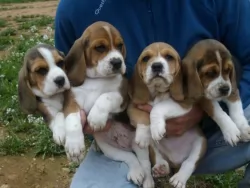 If your Kerry Beagle is ill or injured you need to get him to the vet for a full assessment. As a puppy he will also need certain vaccinations to protect him from some life-threatening illnesses as well as getting de-wormed.
If your Kerry Beagle is ill or injured you need to get him to the vet for a full assessment. As a puppy he will also need certain vaccinations to protect him from some life-threatening illnesses as well as getting de-wormed.
Bad smelling breath is a symptom that your pet's teeth need checking. If you're not sure how to maintain his teeth, make sure your Kerry Beagle has professional dental cleaning to ensure his gums and teeth are kept in a healthy state. Your vet will give you advise on how to watch for periodontal disease.
In hot weather particularly, check your dog over for fleas and ticks and remove them.
Heartworm is a fatal disease which which can affect your dog. Speak to your vet about treatments as living in a hot, wet area opens you pet up to bites from infected mosquitoes.
Health Problems: are mostly inherited. You can avoid this by searching for a good breeder that can clear out the hereditary diseases.
The Australian Cattle Dog is one of the breeds that can be born with progressive retinal atrophy. Progressive rod-cone degeneration is a disease that causes the rods and cones in the retina of the eye to degenerate. It might lead to blindness.
The Australian Cattle Dog is one of the rare breeds with recessive piebald alleles. This gene is the reason why they have white colour on their coat. But, unfortunately, this gene can be the reason why congenital hereditary deafness develops.
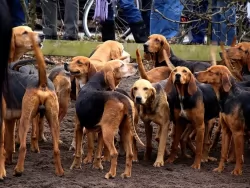 Because of the short coat of the Kerry Beagle, he is looked upon as a low maintenance dog. He doesn't shed very much, and simple grooming is required such as brushing the coat twice a week.
Because of the short coat of the Kerry Beagle, he is looked upon as a low maintenance dog. He doesn't shed very much, and simple grooming is required such as brushing the coat twice a week.
His nails will also need to be clipped, as left long, they can hook on things and rip your pet's flesh.
You will need to check his teeth and also check inside his ears. Dogs with floppy ears are more prone to infection in the ears and this can cause terrible pain for your pet.
If you keep your Kerry Beagle as a hunting dog, you will know that active dogs like these have different dietary requirements to companion dogs.
All that activity requires top quality nutrition and a certain amount of calories. If you're buying dry kibble, make sure its the highest quality so that he doesn't require huge portions to satisfy him. Leading canine nutritionists recommend a hunting dog like this be fed a large meal once a day and preferably in the evening, after all the hunting action.
Herding dog have a history of the joint diseases. That’s why some of the pet suggest feeding a herding dog with meat like chicken, turkey, beef, lamb and fish. Dry dog food, even premium quality, may not be enough for this energetic dogs and their bone structure. But it depends on the dog. The best advice is to always take an advice from your breeder or your wet.
You won’t be very busy with grooming your Australian cattle dog. You don’t have to take everyday care of it. Occasional brushing will be more than enough. Bath the dog only when you notice odour problem.
The Australian Cattle Dog needs a high level of activity. Like many other herding dog breeds, they love walks, spending time with people, running or doing any athletic sports with them, teaching them tricks since they have above average intelligence. Fetching will be super fun for everyone, agility, competitions or any other challenging activity. They love water and they swim very well so you can take the dog with you to the nearest pool and have a great time.